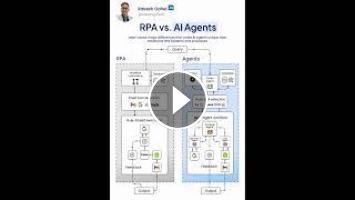RPA has transformed how AI Agents interact with systems, but AI Agents are now shaping the future of RPA.
RPA (Robotic Process Automation) revolutionized BPA (Business Process Automation) but faced limitations in autonomous execution. Here’s a comparison:
???? RPA (Robotic Process Automation)
- Workflow Instructions: Follows predefined steps for task execution.
- Database Access: Retrieves structured data to support processes.
- Fixed Tool Selection: Uses predefined tools like Gmail, Google Suite, and Slack.
- Rule-Based Execution: Operates on if/else logic, enhanced by LLM calls for decision-making.
- Feedback Loop: Delivers outputs (e.g., via Gmail) and refines based on feedback.
???? AI Agents
AI Agents introduce intelligence and adaptability to automation:
- Query Handling: A Query Agent processes user inputs dynamically.
- Memory Integration: Retains context for smarter, more relevant responses.
- Auto Tool Selection: Dynamically chooses tools based on task needs.
- Multi-Agent Workflow: A Control Agent coordinates Retriever and Data Agents for efficient task execution.
- Feedback & Output: Generates optimized outputs with continuous learning.
???? Why AI Agents Surpass Traditional RPA
AI Agents excel with a wide range of tool selection and multi-agent workflows.
Unlike RPA’s fixed toolset, AI Agents dynamically select tools and handle complex, unstructured workflows with ease.
????Learn in-depth from here: https://www.linkedin.com/posts/rakeshgohel01_rpa-has-paved-the-way-for-how-ai-agents-interact-activity-7323688419698581504-Gb-Y?utm_source=share&utm_medium=member_desktop&rcm=ACoAADbIlqoBXsMJDd5Rmp0n6hdlqpbGlM-mkP4
#fyp #aiagents #llm #openai #ai
RPA (Robotic Process Automation) revolutionized BPA (Business Process Automation) but faced limitations in autonomous execution. Here’s a comparison:
???? RPA (Robotic Process Automation)
- Workflow Instructions: Follows predefined steps for task execution.
- Database Access: Retrieves structured data to support processes.
- Fixed Tool Selection: Uses predefined tools like Gmail, Google Suite, and Slack.
- Rule-Based Execution: Operates on if/else logic, enhanced by LLM calls for decision-making.
- Feedback Loop: Delivers outputs (e.g., via Gmail) and refines based on feedback.
???? AI Agents
AI Agents introduce intelligence and adaptability to automation:
- Query Handling: A Query Agent processes user inputs dynamically.
- Memory Integration: Retains context for smarter, more relevant responses.
- Auto Tool Selection: Dynamically chooses tools based on task needs.
- Multi-Agent Workflow: A Control Agent coordinates Retriever and Data Agents for efficient task execution.
- Feedback & Output: Generates optimized outputs with continuous learning.
???? Why AI Agents Surpass Traditional RPA
AI Agents excel with a wide range of tool selection and multi-agent workflows.
Unlike RPA’s fixed toolset, AI Agents dynamically select tools and handle complex, unstructured workflows with ease.
????Learn in-depth from here: https://www.linkedin.com/posts/rakeshgohel01_rpa-has-paved-the-way-for-how-ai-agents-interact-activity-7323688419698581504-Gb-Y?utm_source=share&utm_medium=member_desktop&rcm=ACoAADbIlqoBXsMJDd5Rmp0n6hdlqpbGlM-mkP4
#fyp #aiagents #llm #openai #ai
- Catégories
- Intelligence Artificielle & Business














Commentaires